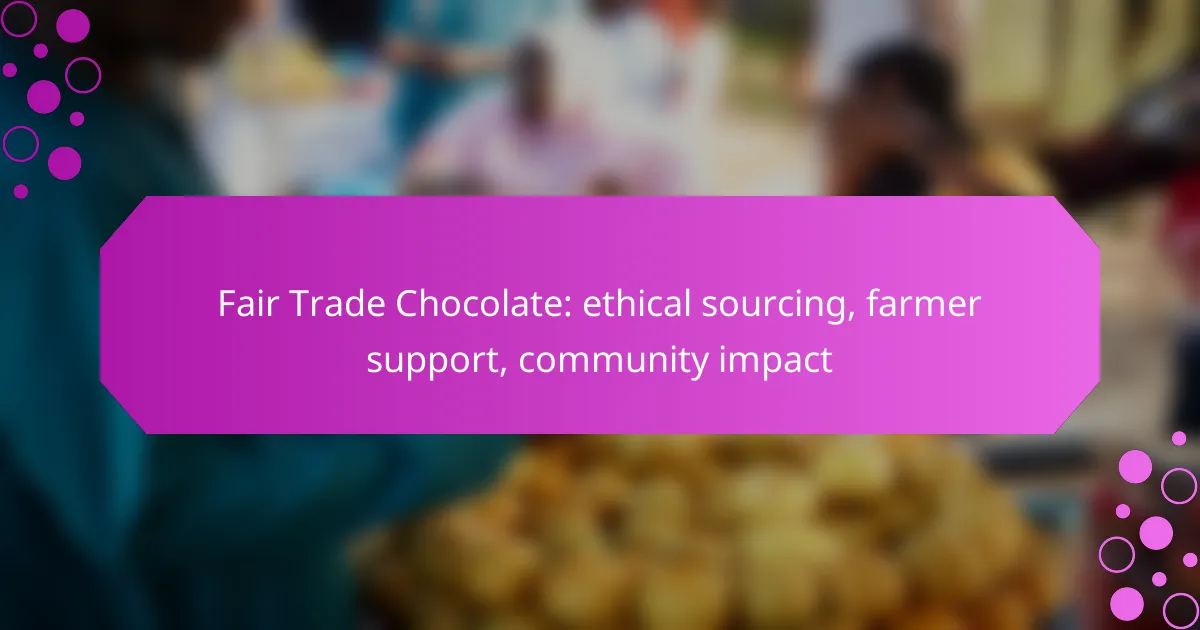Fair Trade Chocolate is dedicated to ethical sourcing, ensuring that farmers receive fair compensation while promoting sustainable farming practices. By prioritizing the welfare of producers, this approach not only supports individual farmers but also enhances community development and living standards. Through various initiatives, Fair Trade Chocolate fosters a more equitable chocolate industry that benefits both people and the environment.

How does Fair Trade Chocolate support Australian farmers?
Fair Trade Chocolate supports Australian farmers by ensuring they receive fair compensation and fostering sustainable practices. This approach not only benefits individual farmers but also strengthens their communities through various initiatives.
Direct payments to farmers
Fair Trade Chocolate guarantees direct payments to farmers, which means they receive a higher percentage of the sale price compared to conventional trading systems. This direct transaction model helps farmers maintain a stable income, reducing their vulnerability to market fluctuations.
For example, farmers may receive payments that are significantly above the market rate, allowing them to invest in their farms and families. This financial security is crucial for their long-term sustainability.
Access to fair pricing
Fair Trade standards ensure that farmers have access to fair pricing for their cocoa. This pricing is often set above the market average, which helps farmers cover their production costs and invest in their communities.
In Australia, Fair Trade Chocolate products often reflect this commitment, with prices that support ethical sourcing. Consumers can feel confident that their purchases contribute to a more equitable system for farmers.
Investment in community projects
Fair Trade Chocolate initiatives often include funding for community projects that benefit farmers and their families. These projects may focus on education, healthcare, and infrastructure improvements, fostering overall community development.
For instance, some Fair Trade cooperatives in Australia have invested in local schools and health clinics, enhancing the quality of life for farmers and their communities. This holistic approach not only supports individual farmers but also strengthens the social fabric of their regions.

What are the ethical sourcing practices in Fair Trade Chocolate?
Ethical sourcing practices in Fair Trade Chocolate focus on ensuring fair wages for farmers, promoting sustainable farming methods, and fostering community development. These practices aim to create a more equitable chocolate industry by prioritizing the welfare of producers and their environments.
Certification standards
Certification standards for Fair Trade Chocolate include guidelines that ensure farmers receive fair compensation, work in safe conditions, and adhere to environmentally friendly practices. Organizations like Fair Trade International and Fair Trade USA set these standards, which often require a minimum price for cocoa and additional premiums for community projects.
To be certified, producers must demonstrate compliance with these standards through regular audits. This certification not only benefits farmers but also assures consumers that their purchases support ethical practices.
Transparency in supply chains
Transparency in supply chains is crucial for Fair Trade Chocolate, as it allows consumers to trace the origins of their chocolate and understand the journey from farm to store. This transparency helps build trust between consumers and producers, ensuring that farmers are fairly compensated for their work.
Many Fair Trade brands provide detailed information about their sourcing practices, including the specific cooperatives they work with and the impact of their purchases. This level of transparency encourages accountability and empowers consumers to make informed choices.
Environmental sustainability
Environmental sustainability in Fair Trade Chocolate involves practices that protect ecosystems and promote biodiversity. This includes organic farming methods, agroforestry, and reduced use of harmful pesticides, which contribute to healthier soil and surrounding environments.
By supporting sustainable farming, Fair Trade Chocolate not only helps farmers adapt to climate change but also ensures the long-term viability of cocoa production. Consumers can look for certifications that indicate environmentally friendly practices, which often align with ethical sourcing standards.

How does Fair Trade Chocolate impact local communities?
Fair Trade Chocolate positively influences local communities by ensuring ethical sourcing practices that support farmers and enhance their quality of life. This approach fosters sustainable development, leading to improved living standards and community welfare.
Improved education opportunities
Fair Trade initiatives often allocate a portion of profits to educational programs in farming communities. This funding can help build schools, provide scholarships, and supply learning materials, significantly increasing access to quality education for children. As a result, families are more likely to prioritize education, breaking the cycle of poverty.
For example, in regions where Fair Trade chocolate is produced, children may receive support for tuition fees or school supplies, enabling them to attend school regularly and pursue higher education.
Healthcare access
Fair Trade Chocolate contributes to better healthcare access by directing funds towards local health services. This can include establishing clinics, providing medical supplies, and offering health education programs. Improved healthcare leads to healthier communities, which is essential for sustainable development.
Farmers and their families benefit from regular health check-ups and preventive care, reducing the incidence of illness and enhancing overall productivity. In some cases, Fair Trade cooperatives have partnered with local health organizations to facilitate these services.
Economic development initiatives
Fair Trade practices promote economic development by ensuring farmers receive fair prices for their cocoa, which can be significantly higher than conventional market rates. This financial stability allows farmers to invest in their businesses and communities, fostering growth and resilience.
Additionally, Fair Trade cooperatives often engage in community projects, such as infrastructure improvements or sustainable farming training programs. These initiatives can create jobs and stimulate local economies, benefiting everyone in the community.

What are the benefits of buying Fair Trade Chocolate?
Buying Fair Trade Chocolate supports ethical sourcing practices, enhances farmer livelihoods, and contributes positively to communities. This approach ensures that producers receive fair compensation, which fosters sustainable development and improves the quality of life for farming families.
Support for ethical brands
Choosing Fair Trade Chocolate means supporting brands that prioritize ethical practices in their supply chains. These brands commit to paying farmers a fair price, which often exceeds the market rate, ensuring that producers can sustain their livelihoods. By purchasing these products, consumers help create a demand for transparency and fairness in the chocolate industry.
Many Fair Trade brands also engage in direct trade relationships with farmers, eliminating intermediaries and allowing for better communication and collaboration. This strengthens the connection between consumers and producers, fostering a sense of community and shared responsibility.
Quality assurance
Fair Trade Chocolate often boasts superior quality due to the emphasis on sustainable farming practices. Farmers are encouraged to use organic methods and avoid harmful chemicals, resulting in healthier crops and richer flavors. This commitment to quality is reflected in the taste and texture of the chocolate.
Additionally, Fair Trade certification involves rigorous standards that ensure products meet specific quality benchmarks. Consumers can trust that the chocolate they purchase has been produced with care and attention to detail, enhancing their overall experience.
Positive environmental impact
Buying Fair Trade Chocolate contributes to environmentally sustainable practices that protect ecosystems and biodiversity. Many Fair Trade farmers use agroforestry methods, which promote the growth of shade trees alongside cocoa plants, helping to maintain soil health and reduce deforestation.
Furthermore, Fair Trade initiatives often include training for farmers on sustainable farming techniques, which can lead to reduced pesticide use and improved water management. This not only benefits the environment but also ensures that future generations of farmers can continue to produce high-quality cocoa sustainably.

How to choose Fair Trade Chocolate products?
Choosing Fair Trade Chocolate products involves identifying certified brands that prioritize ethical sourcing and support for farmers. Look for specific labels and research brand practices to ensure your purchase contributes positively to communities.
Look for certification labels
Certification labels are crucial indicators of Fair Trade practices. Look for well-known certifications such as Fair Trade International or Fair Trade USA, which ensure that producers receive fair compensation and work under safe conditions.
These labels often include information about the percentage of Fair Trade ingredients, helping you make informed choices. Remember, not all chocolate labeled as “organic” or “sustainable” meets Fair Trade standards, so focus on those specific certifications.
Research brand commitments
Investigating a brand’s commitment to Fair Trade principles can reveal their dedication to ethical practices. Many companies provide transparency reports or sustainability statements on their websites, detailing their sourcing practices and farmer support initiatives.
Look for brands that actively engage with farmers, invest in community projects, or have long-term partnerships with cooperatives. This commitment often translates into better quality chocolate and a more significant impact on the communities involved.
Compare product sourcing stories
Understanding the sourcing stories behind chocolate products can help you assess their ethical impact. Many brands share narratives about their sourcing journeys, highlighting the farmers and regions involved in production.
Compare these stories to see how they align with Fair Trade values. Brands that emphasize direct trade relationships and community development are often more trustworthy. Consider reaching out to brands for more information if their sourcing practices are unclear.

What are the leading Fair Trade Chocolate brands in Australia?
The leading Fair Trade chocolate brands in Australia prioritize ethical sourcing, support for farmers, and positive community impact. Notable brands include Alter Eco, Oxfam, and Pana Chocolate, each committed to sustainable practices and fair compensation for cocoa producers.
Alter Eco
Alter Eco is a prominent Fair Trade chocolate brand known for its commitment to sustainability and ethical sourcing. The company sources its cocoa from small-scale farmers who receive fair wages and are supported through various community initiatives.
Alter Eco offers a range of chocolate products, including dark chocolate bars and truffles, all certified organic and Fair Trade. This ensures that the farmers not only earn a living wage but also benefit from environmentally friendly farming practices.
When choosing Alter Eco, consumers can feel confident that their purchase contributes to better livelihoods for cocoa farmers and helps promote sustainable agriculture. Look for their products in health food stores and online retailers across Australia.
